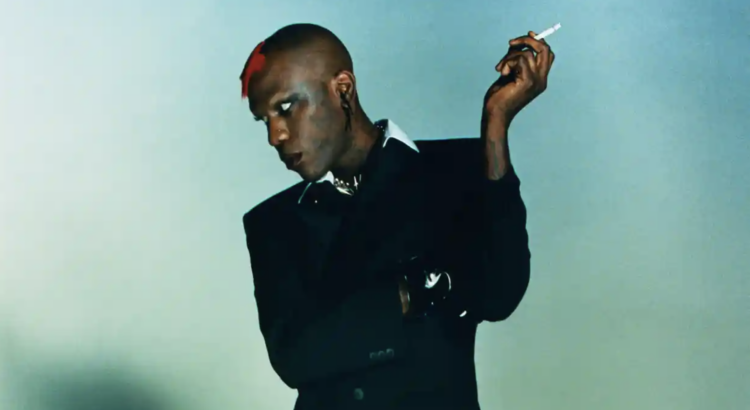On March 17th, Yves Tumor released the anticipated follow-up to his 2021 EP The Asymptotic World. The full-length album, titled Praise A Lord Who Chews But Which Does Not Consume (Or Simply, Hot Between Worlds), features singles released over the past year, as well as fresh new tracks that carry Yves’ signature sounds— a mesh of rock, pop, psychedelia, and darkly ambiguous lyrics hinting at Heaven, Hell, and everything in between.
I approached this project with a bit of apprehension; Yves’ 2020 album Heaven to a Tortured Mind reinvented my understanding of genre, combining ethereal vocals with experimental instrumentation to evoke the awe-inducing experience of watching the finale of a firework show. I wondered how— or if— this kind of collage of genres could be improved upon without losing its dazzling freshness. Praise A Lord Who Chews But Which Does Not Consume absolutely did not disappoint. Despite dialing down the erratic theatrics of previous albums, Yves Tumor has re-emerged as an artist who is confident in his artistic strengths and knows how to show them off. With the help of Grammy award-winning producer Noah Goldstein (Kanye’s My Beautiful Dark Twisted Fantasy), Yves’ signature sound is smoother than ever.
Praise A Lord notably conforms to genre, or at least a consistent voice, more than any of their previous projects. Yves finds the delicate intersection of theatrical pop and distortion-heavy rock, altering catchy pop melodies with thick and fuzzy guitar, layered instrumentation, and airy vocals that preach existential philosophies and poetic metaphor. The opening track, “God is a Circle”, was released as a single in November and remains my favorite on the album. It opens with a scream and heavy breathing that melts into the melody, establishing a tone of darkness and obsession as Yves drawls “Sometimes, it feels like, there’s places in my mind that I can’t go”. The rest of the tracks fall into a consistent formula; Tumor’s delicate vocals, evocative of Prince’s versatile emotionality, float over sonic atmospheres packed with erratic chord progressions and synths that feel alive. “Meteroa Blues” builds on its drums and guitar slowly, bringing the song to an energetic climax of intense noise. The hazy interlude in “Parody” feels like crossing a liminal space between worlds. “Echolalia” is the most danceable track on the album, with fast-paced drums ushering in a catchy vocal melody. The last track, “Ebony Eye”, reminds me the most of the dramatic crescendo and electronic sparkle of Heaven to a Tortured Mind which initially drew me to his music. Dramatic instrumentation, dreamy synths, and continually layered vocals create a landscape of sparkling colors and excitement. It’s the perfect ending to the album, encapsulating Yves’ willingness to try anything— and everything— at the same time.
Although Praise a Lord isn’t my favorite album (Heaven to a Tortured Mind always takes the cake), Yves has proven his maturity as an experimental artist. The album carries his ambiguous voice and imaginative style, but contains it within a more palatable (and radio-playable) format, balancing pop and rock song structures with contemporary instrumentation. Each track feels alive, having a mind of its own, almost always ending in a completely different spot and with a different attitude than where it started. It’s truly an immersive listening experience that is worth the time. Even if his unique approach isn’t something you are drawn to, it sparks thought about what genre is— or what it can be in the future, and what the pioneers of contemporary genres will sound like. Yves Tumor has, in my opinion, cemented his spot as a trailblazer of the future.
Praise A Lord Who Chews But Which Does Not Consume is available on popular streaming platforms. Yves Tumor is coming to the Majestic Theatre in Detroit on May 10th. Get your tickets while they’re still available for a unique live music experience.


